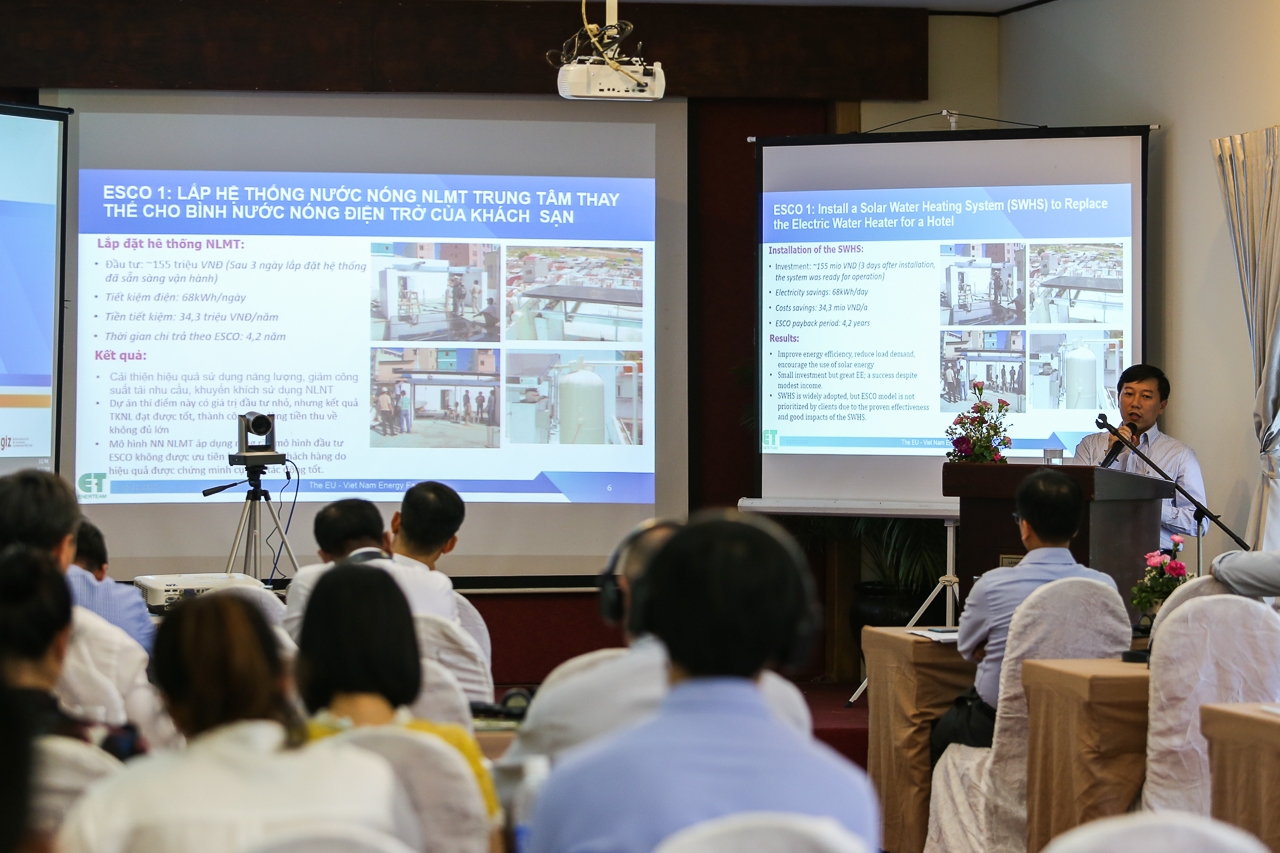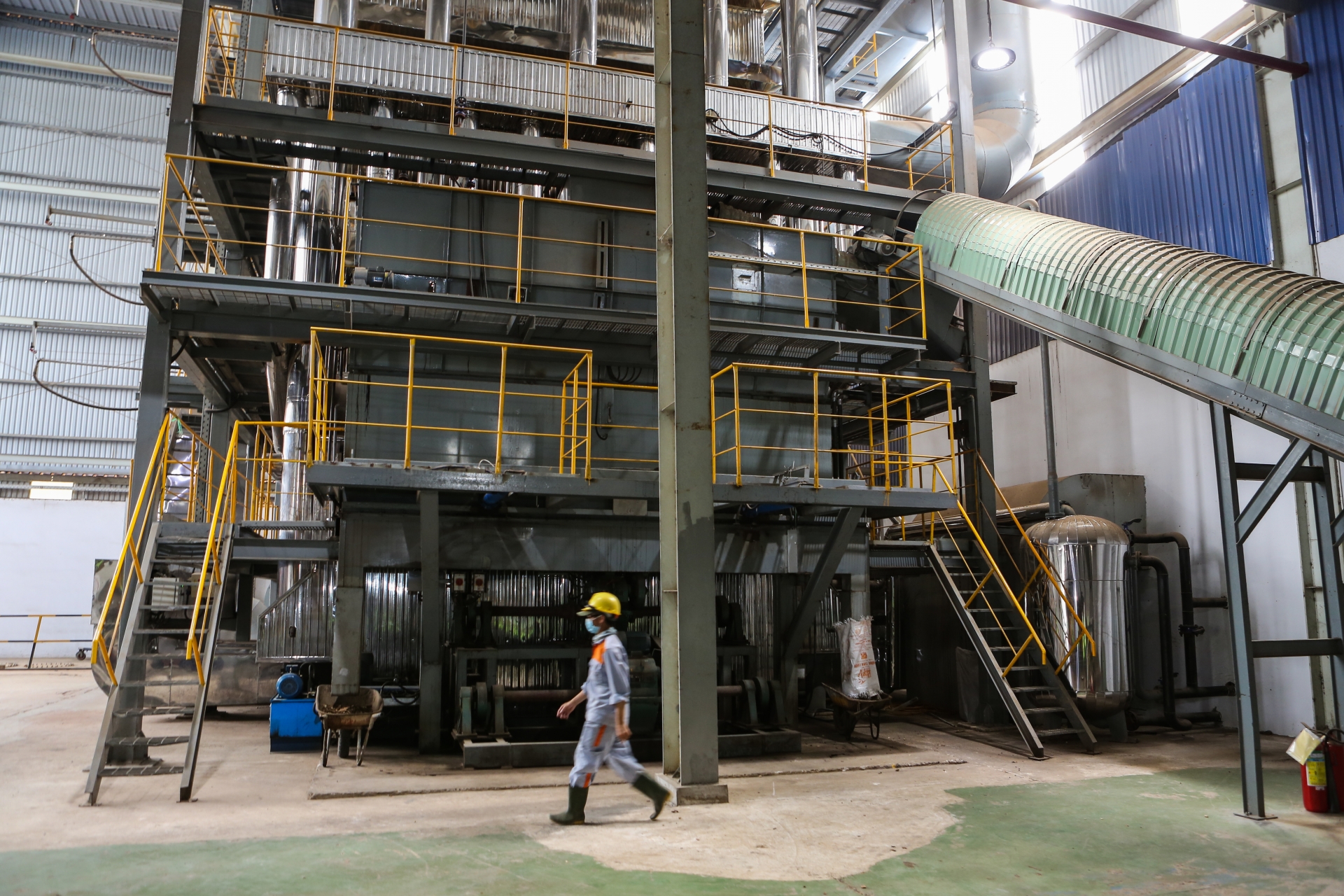ESCO Vietnam has potential but faces challenges
 |
| Ma Khai Hien, vice director of the Energy Conservation Research and Development Centre (Enerteam), discussed the difficulties and barriers when implementing the ESCO business model |
Recently, the “ESCO, A future business model for Vietnam – Lessons learned from international and national ESCO activities/models” workshop was held by the Ministry of Industry and Trade (MoIT) and the EU-Vietnam Energy Facility (EVEF).
The event aims to share experiences in developing the ESCO model and raise awareness among government agencies to adjust the policy framework for this model in the future.
Trinh Quoc Vu, deputy director general of the Department of Energy Efficiency and Sustainable Development, stated that ESCOs play an important role in energy efficiency and in accomplishing the objectives of the Vietnam National Energy Efficiency Programme which aims to reduce energy consumption by 5-7 per cent in 2019-2025 and 8-10 per cent in 2019-2030.
ESCO projects have shown great potential in improving energy efficiency. For example, the flagship ESCO project on steam and electricity generation and drying brewers’ spent grain at the Heineken Brewery in Ba Ria-Vung Tau, in cooperation with Indochine Import Export Investment Industrial JSC (Indochine) saves roughly 30 per cent of the current electricity use.
 |
| Part of the project generating steam-electricity and drying spent grain for Heineken Vietnam Brewery in Ba Ria-Vung Tau |
This is the largest ESCO project in the South of Vietnam, with the total investment capital of VND180 billion. In a year, the project will cut CO2 emissions by 76,000 tonnes, supply 48 million kWh of electricity and 200,000 tonnes of steam, equivalent to 80 per cent of electricity and 100 per cent of steam for the Heineken factory.
Indochine commits to using biomass materials such as chopped wood and melaleuca tree for the whole process to produce heat and steam, dry spent grain, and partially generate electricity for Heineken.
Nguyen Thanh Quang, technical director of Indochine said that it would take eight to ten years for the ESCO to see returns on the investment. “We are in charge of the whole process from finding a location for the plant and installing the 1,5km pipe system to controlling input materials.”
“For launching a project, we had to borrow about 70 per cent of the investment cost from the banks, but some financial institutions will allow you to apply for a loan of up to 80 per cent,” Quang stated, explaining that ESCO policies do not necessarily require customers to use their own capital.
There have been many challenges for ESCO projects in Vietnam, both when it comes to the policies and its partners. For instance, the legal and regulatory frameworks can prove inadequate while there is no financial support mechanism for developing and implementing energy saving projects. Besides, only a handful of funds and financial institutions participate in ESCO activities.
Also, customers do not yet trust ESCO projects and a lack of commitment to enter into a binding agreement on the side of businesses can cause complications and high risks for ESCO businesses.
Head of the Energy Efficiency Component of EU-Vietnam Energy Facility (EVEF), Markus Bissel, said, “The current ESCO market in Vietnam is quite poor. There are only a few projects implemented in several sectors, mostly in the steam- and heat production market, that’s why Vietnam definitely needs support in this regard.”
He added that the government plays an important role in building a legal base for ESCOs as well as in providing financial support. “At the moment, there are around 50 ESCOs in Vietnam, but most of them do not have the financial capabilities to go on.”
The workshop was organised by the EVEF in cooperation with the Ministry of Industry and Trade. EVEF is a joint technical cooperation project that is co-financed by the EU and the German Federal Ministry for Economic Cooperation and Development (BMZ), implemented by Deutsche Gesellschaft für Internationale Zusammenarbeit (GIZ) GmbH in close cooperation with the Ministry of Industry and Trade.
The aim of the project is to contribute to the enhancement of governance in the energy sector with a view to facilitating the shift to a more sustainable energy development path in Vietnam. The project will also contribute to the implementation of the regulatory framework needed to achieve Vietnam‘s commitment to reduce its energy‐related greenhouse gas emissions in the context of Vietnam‘s Nationally Determined Contributions (NDCs).
What the stars mean:
★ Poor ★ ★ Promising ★★★ Good ★★★★ Very good ★★★★★ Exceptional
Related Contents
Latest News
More News
- Bac Ai Pumped Storage Hydropower Plant to enter peak construction phase (January 27, 2026 | 08:00)
- ASEAN could scale up sustainable aviation fuel by 2050 (January 24, 2026 | 10:19)
- 64,000 hectares of sea allocated for offshore wind surveys (January 22, 2026 | 20:23)
- EVN secures financing for Quang Trach II LNG power plant (January 17, 2026 | 15:55)
- PC1 teams up with DENZAI on regional wind projects (January 16, 2026 | 21:18)
- Innovation and ESG practices drive green transition in the digital era (January 16, 2026 | 16:51)
- Bac Ai hydropower works stay on track despite holiday period (January 16, 2026 | 16:19)
- Fugro extends MoU with PTSC G&S to support offshore wind growth (January 14, 2026 | 15:59)
- Pacifico Energy starts commercial operations at Sunpro Wind Farm in Mekong Delta (January 12, 2026 | 14:01)
- Honda launches electric two-wheeler, expands charging infrastructure (January 12, 2026 | 14:00)

 Tag:
Tag:




















 Mobile Version
Mobile Version